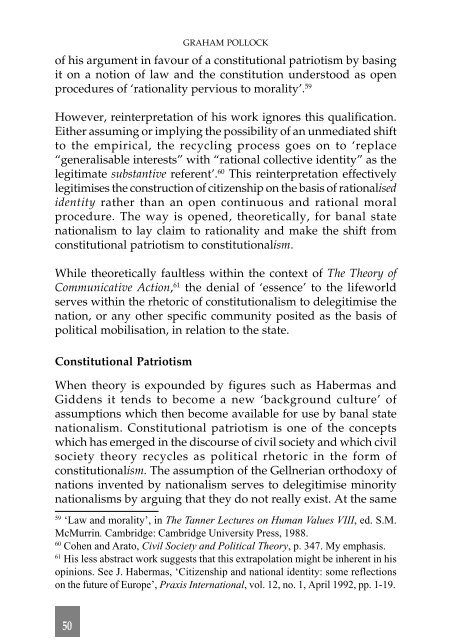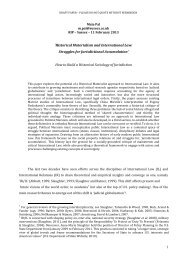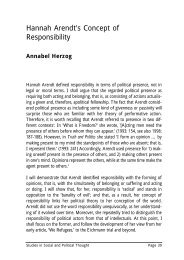Civil Society Theory and Euro-Nationalism - University of Sussex
Civil Society Theory and Euro-Nationalism - University of Sussex
Civil Society Theory and Euro-Nationalism - University of Sussex
You also want an ePaper? Increase the reach of your titles
YUMPU automatically turns print PDFs into web optimized ePapers that Google loves.
50<br />
GRAHAM POLLOCK<br />
<strong>of</strong> his argument in favour <strong>of</strong> a constitutional patriotism by basing<br />
it on a notion <strong>of</strong> law <strong>and</strong> the constitution understood as open<br />
procedures <strong>of</strong> ‘rationality pervious to morality’. 59<br />
However, reinterpretation <strong>of</strong> his work ignores this qualification.<br />
Either assuming or implying the possibility <strong>of</strong> an unmediated shift<br />
to the empirical, the recycling process goes on to ‘replace<br />
“generalisable interests” with “rational collective identity” as the<br />
legitimate substantive referent’. 60 This reinterpretation effectively<br />
legitimises the construction <strong>of</strong> citizenship on the basis <strong>of</strong> rationalised<br />
identity rather than an open continuous <strong>and</strong> rational moral<br />
procedure. The way is opened, theoretically, for banal state<br />
nationalism to lay claim to rationality <strong>and</strong> make the shift from<br />
constitutional patriotism to constitutionalism.<br />
While theoretically faultless within the context <strong>of</strong> The <strong>Theory</strong> <strong>of</strong><br />
Communicative Action, 61 the denial <strong>of</strong> ‘essence’ to the lifeworld<br />
serves within the rhetoric <strong>of</strong> constitutionalism to delegitimise the<br />
nation, or any other specific community posited as the basis <strong>of</strong><br />
political mobilisation, in relation to the state.<br />
Constitutional Patriotism<br />
When theory is expounded by figures such as Habermas <strong>and</strong><br />
Giddens it tends to become a new ‘background culture’ <strong>of</strong><br />
assumptions which then become available for use by banal state<br />
nationalism. Constitutional patriotism is one <strong>of</strong> the concepts<br />
which has emerged in the discourse <strong>of</strong> civil society <strong>and</strong> which civil<br />
society theory recycles as political rhetoric in the form <strong>of</strong><br />
constitutionalism. The assumption <strong>of</strong> the Gellnerian orthodoxy <strong>of</strong><br />
nations invented by nationalism serves to delegitimise minority<br />
nationalisms by arguing that they do not really exist. At the same<br />
59 ‘Law <strong>and</strong> morality’, in The Tanner Lectures on Human Values VIII, ed. S.M.<br />
McMurrin. Cambridge: Cambridge <strong>University</strong> Press, 1988.<br />
60 Cohen <strong>and</strong> Arato, <strong>Civil</strong> <strong>Society</strong> <strong>and</strong> Political <strong>Theory</strong>, p. 347. My emphasis.<br />
61 His less abstract work suggests that this extrapolation might be inherent in his<br />
opinions. See J. Habermas, ‘Citizenship <strong>and</strong> national identity: some reflections<br />
on the future <strong>of</strong> <strong>Euro</strong>pe’, Praxis International, vol. 12, no. 1, April 1992, pp. 1-19.
















